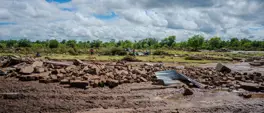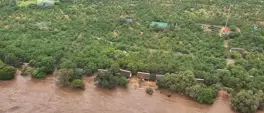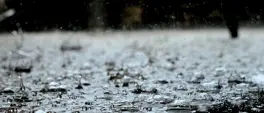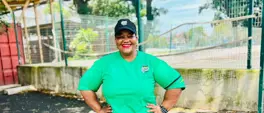Are wet wipes that say ‘flushable’ really so? We investigate…
Tasleem Gierdien
24 July 2025 | 6:33Consumer journalist Wendy Knowler investigates 'biodegradable' wet wipe products on South African shelves.
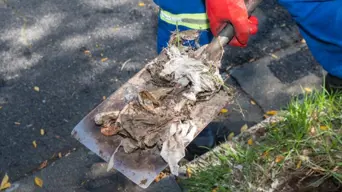
CapeTalk's Pippa Hudson speaks to consumer journalist Wendy Knowler.
Listen below:
'Biodegradable' wet wipes aren’t the green win consumers might think.
Flushing wet wipes, even those claiming to be 'flushable', causes significant blockages in sewer systems globally, particularly in large cities, leading to costly repairs and environmental damage.
The City of Cape Town’s Water and Sanitation teams had to attend to 1,072 sewer blockages in Camps Bay, Bakoven, Clifton and Sea Point between July 2023 and March 2025. The City says that one of the main causes of these blockages is wet wipes being flushed down the toilet along with other items which do not belong in the sewer system.
As much as 6,000 kg of waste is removed from the City’s sewer pump station screens monthly, much of it wet wipes.
ALSO READ: Wipe out the wipes: Main cause of sewer blockages in Cape Town revealed
Wet wipes leading cause of blocked pipes in Camps Bay, Bakoven, Clifton and Sea Point
Wet wipes can combine with grease and other debris to form 'fatbergs'; massive blockages that clog sewer systems. In 2013, London famously removed a 15-tonne fatberg, made up mostly of discarded wipes, taking weeks to dismantle.
Many wet wipes are marketed as being 'flushable' or 'biodegradable', but these claims are, in many cases, inaccurate or misleading, contributing to significant sewer system issues.
'Flushable' wipes do not disintegrate quickly enough to avoid clogging sewer systems. Unlike toilet paper, which breaks down almost immediately in water, wet wipes are designed to remain intact when wet, often containing synthetic fibres such as polypropylene or regenerated cellulose that degrade slowly or not at all in real-world sewer conditions.
In a Toronto Metropolitan University study, researchers tested 23 'flushable' wipes and found that only two partially disintegrated.
Similarly, in the case of wipes labelled 'biodegradable' – made with cellulose-based fibres such as rayon or viscose – they do degrade, but in many cases not quickly enough to stop them becoming an environmental problem.
A 2023 ScienceDirect study found that more than half of 'biodegradable' wipes contain synthetic fibres or chemical additives that inhibit degradation, leading to persistent microfibers that pollute waterways.
The US-based Association of the Nonwoven Fabrics Industry (INDA) has developed voluntary guidelines for flushability, but these have been criticised for not replicating real-world sewer conditions.
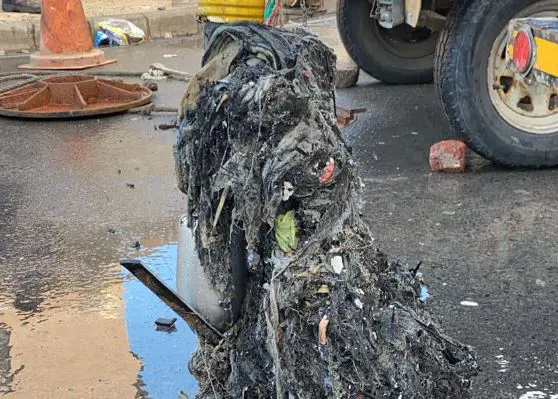
Image by: City of Cape Town
Why are brands allowed to get away with this kind of greenwashing?
There are no legally binding standards for 'flushable' claims, allowing manufacturers to self-regulate, which wastewater experts argue leads to misleading marketing.
Several lawsuits have challenged manufacturers’ claims.
Procter & Gamble settled a federal class action lawsuit in New York in 2020, agreeing to remove the claim that their Charmin Freshmates are 'safe for sewer and septic systems'.
The plaintiffs had argued that the wipes do not disintegrate upon flushing or break down sufficiently to pass through pipes and thus could cause serious problems for plumbing, sewer, and septic systems.
Unlike in other parts of the world, where studies and lawsuits have directly targeted flushable wipes, South Africa lacks detailed public reports pinpointing wet wipes as a primary cause of sewer issues.
But the Green Drop report’s findings on failing wastewater infrastructure suggest that wipes contribute to the problem, as they do globally.
And the City of Cape Town most definitely considers them a no-no.
Mayoral Committee Member for Water and Sanitation, Councillor Zahid Badroodien, told us that improper disposal of wet wipes is a massive issue in Cape Town, affecting operations at pump stations, causing sewer blockages that lead to sewer overflows and even causing damage to the City’s water and sanitation infrastructure.
“It is important to remember that only the three Ps can be flushed – pee, poop and (toilet) paper.
“Anything else that makes its way into the drainage system will eventually cause a blockage or damage the system. While it may not seem that one flushed wet wipe here and there is enough to cause these problems, it is the accumulation of wet wipes, cooking fat, nappies and other items disposed of incorrectly by many people that can quickly cause a large solid ‘wall’ that stops the flow of sewage."
Between 15 December 2023 and 15 January 2024, Cape Town recorded more than 8,400 sewer blockages.
Biggest culprits? Condoms, earbuds, wet wipes, rags, plastics, nappies, and cotton swabs.
Knowler challenged some local manufacturers about greenwashing wipes.
Knowler asked the manufacturers of some of these wipes to justify their claims, and this is what they said:
Baby Soft:
Baby Soft Moist Toilet Tissue claims to be '100% safe to flush' as well as biodegradable. They are recommended to be used 'together with dry toilet tissue' for superior cleaning.
She asked Kimberly Clark for the evidence of the 'safe to flush' and biodegradable claims.
"Baby Soft Moist toilet tissues are made from 100% cellulose fibres and do not contain plastic. They are safe to flush when disposed of correctly, and we recommend that no more than two sheets be disposed of at one time.
“Our Baby Soft® Moist toilet tissues meet all industry standards and are designed to break down in the sewer system and do not cause blockages. All its tests must be conducted and passed to demonstrate conformance to the guidelines and thus claim 'FLUSHABLE' or ‘Safe to flush’ on the pack. Our Baby Soft® Moist toilet tissues have successfully passed these tests, meeting the EDANA Flushability Guidelines."
GQ Tissue's Satin Touch’s Flushies:
"We use Bioflush."
BioFlush can decompose 100% in nature and disperse in the water.
It is produced by using 100% natural sources, is kind to the skin due to its very soft touch and is designed to meet all the needs and expectations of the wet toilet tissue industry.
BioFlush helps to make life easier for everybody by not clogging the toilets and city sewers.
The flushability of BioFlush has been approved by seven tests performed by CTP Laboratories in France according to the regulations of EDANA and INDA Guideline 3.
The non-woven material used is made from 100% wood pulp.
Sani Touch:
Annette Devenish of Sani Touch, which makes a very wide range of wipes from medical grade to lappies used at the braai, doesn’t make flushable wipes, but does claim biodegradability and recyclability.
She explains the issue…
The problem is that wipes by nature are supplied wet, so they need wet strength. The nature of a wet wipe needs to be strong enough not to tear while wiping or cleaning (especially if being used on the bottom bits). They also need shelf life, so they need to stay wet in a solution on a shelf or store without starting to biodegrade and break down prior to use.
The wet strength often comes from either binders or from fibres which are entangled to be strong. But this very fact makes even the most compostable and biodegradable nonwoven bases take a very long time to break down, even in an active sewage system.
Coupled with this, human nature is, we never take one wipe at a time, but often take way more than is needed. The mass is often more of the problem than the actual wipe itself. If one small wipe was used and flushed at a time, the chance of sewage lines blocking would be minimised.
Our other big problem in South Africa is that we have sewerage systems that are not being upgraded, with many municipal systems having to try to cope with way more waste than they were originally designed to handle, with the influx of people into the cities.
Sani Touch has a range of Ecowipes intended to clean toilet seats, which are made from wet strength paper.
They contain a minimal amount of binder, which is what makes them strong enough to hold the liquid needed to pre-saturate the wipes. They are very thin wipes and perforated to be small wipes about the size of a sheet of toilet paper. The base is very similar in structure to tea bag paper; they will biodegrade over time in the right conditions such as an active compost heap.
The company’s Green Saniwipe Trolley Wipes supplied at the front of Checkers and Shoprite stores are recycled, along with their containers, into objects such as pallets, and plastic timber, used for outdoor furniture, jungle gyms and other amazing products.
Clicks:
Clicks is the brand owner and retailer of MyEarth Eco-Friendly Flushable Baby Wipes, which makes both claims: “100% flushable and biodegradable, designed to disintegrate during municipal treatment, reducing landfill waste.”
What's the best option?
MyEarth Eco-Friendly Flushable Baby Wipes are made of viscose cellulose and wood pulp, making them plastic-free, 100% flushable and biodegradable.
The wipe itself is 100% paper (cellulose) and not made of any synthetic material. The wipe is then considered 'wet toilet paper' when used.
Independent tests have been conducted by the Centre technique du Papier Domaine Universitaire France according to the Guidelines for Assessing the Flushability of Disposable Nonwoven Products, Fourth Edition, May 2018, where it passed many tests.
To conclude: “Only the three Ps can be flushed – pee, poop and (toilet) paper."
Anything else that makes its way into the drainage system will eventually cause a blockage or damage the system.
Scroll up to the audio player to listen to the full conversation.
Get the whole picture 💡
Take a look at the topic timeline for all related articles.






